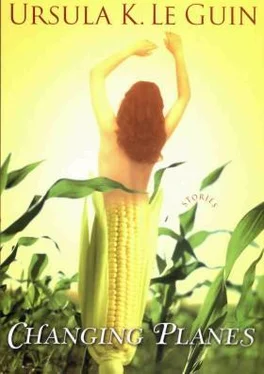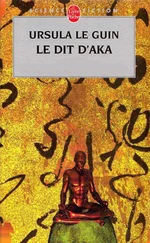The only thing the Islai seemed to have in common, unfortunately, was poverty. The city certainly had been prosperous once, not very long ago. The monorail was a snazzy bit of engineering, but it was showing wear and tear. The surviving old buildings—which were on a scale I found familiar—were grand but run-down, and crowded by the more recent giant’s houses and doll’s houses and buildings like stables or mews or rabbit hutches—a terrible hodgepodge, all of it cheaply built, rickety-looking, shabby. The Islai themselves were shabby, when they weren’t downright ragged. Some of the furrier and featherier ones were clothed only by their fur and feathers. The green boy wore a modesty apron, but his rough trunk and limbs were bare. This was a country in deep, hard economic trouble.
Ai Li A Le was sitting at one of the outside tables at the cafe (the cledifac) next door to the one where she waited tables. She smiled and beckoned to me, and I sat down with her. She had a small bowl of chilled cledif with sweet spices, and I ordered the same. “Please tell me about the Ban,” I asked her.
“We used to look like you,” she said.
“What happened?”
“Well,” she said, and hesitated. “We like science. We like engineering. We are good engineers. But perhaps we are not very good scientists.”
To summarise her story: the Islai had been strong on practical physics, agriculture, architecture, urban development, engineering, invention, but weak in the life sciences, history, and theory. They had their Edisons and Fords but no Darwin, no Mendel. When their airports got to be just like ours, if not worse, they began to travel between planes; and on some plane, about a hundred years ago, one of their scientists discovered applied genetics. He brought it home. It fascinated them. They promptly mastered its principles. Or perhaps they had not quite mastered them before they started applying them to every life-form within reach.
“First,” she said, “to plants. Altering food plants to be more fruitful, or to resist bacteria and viruses, or to kill insects, and so on.”
I nodded. “We’re doing a good deal of that too,” I said.
“Really? Are you…” She seemed not to know how to ask the question she wanted to ask. “I’m corn, myself,” she said at last, shyly.
I checked the translatomat. Uslu: corn, maize. I checked the dictionary, and it said that uslu on Islac and maize on my plane were the same plant.
I knew that the odd thing about corn is that it has no wild form, only a distant wild ancestor that you’d never recognise as corn. It’s entirely a construct of long-term breeding by ancient gatherers and farmers. An early genetic miracle. But what did it have to do with Ai Li A Le?
Ai Li A Le with her wonderful, thick, gold-colored, corn-colored hair cascading in braids from a topknot…
“Only four percent of my genome,” she said. “There’s about half a percent of parrot, too, but it’s recessive. Thank God.”
I was still trying to absorb what she had told me. I think she felt her question had been answered by my astonished silence.
“They were utterly irresponsible,” she said severely. “With all their programs and policies and making everything better, they were fools. They let all kinds of things get loose and interbreed. Wiped out rice in one decade. The improved breeds went sterile. The famines were terrible… Butterflies, we used to have butterflies, do you have them?”
“Some, still,” I said.
“And deletu?” A kind of singing firefly, now extinct, said my translatomat. I shook my head wistfully.
She shook her head wistfully.
“I never saw a butterfly or a deletu. Only pictures… The insecticidal clones got them… But the scientists learned nothing—nothing! They set about improving the animals. Improving us! Dogs that could talk, cats that could play chess! Human beings who were going to be all geniuses and never get sick and live five hundred years! They did all that, oh yes, they did all that. There are talking dogs all over the place, unbelievably boring they are, on and on and on about sex and shit and smells, and smells and shit and sex, and do you love me, do you love me, do you love me. I can’t stand talking dogs. My big poodle Rover, he never says a word, the dear good soul. And then the humans! We’ll never, ever get rid of the Premier. He’s a Healthy, a bloody GAPA. He’s ninety now and looks thirty and he’ll go on looking thirty and being premier for four more centuries. He’s a pious hypocrite and a greedy, petty, stupid, mean-minded crook. Just the kind of man who ought to be siring children for five centuries … The Ban doesn’t apply to him… But still, I’m not saying the Ban was wrong. They had to do something. Things were really awful, fifty years ago. When they realised that genetic hackers had infiltrated all the laboratories, and half the techs were Bioist fanatics, and the Godsone Church had all those secret factories in the eastern hemisphere deliberately turning out genetic melds… Of course most of those products weren’t viable. But a lot of them were… The hackers were so good at it. The chicken people, you’ve seen them?”
As soon as she asked, I realised that I had: short, squat people who ran around in intersections squawking, so that all the traffic gridlocked in an effort not to run them over. “They just make me want to cry,” Ai Li A Le said, looking as if she wanted to cry.
“So the Ban forbade further experimentation?” I asked.
She nodded. “Yes. Actually, they blew up the laboratories. And sent the Bioists for reeducation in the Gubi. And jailed all the Godsone Fathers. And most of the Mothers too, I guess. And shot the geneticists. And destroyed all the experiments in progress. And the products, if they were”—she shrugged—“‘too far from the norm.’ The norm!” She scowled, though her sunny face was not made for scowling. “We don’t have a norm any more. We don’t have species any more. We’re a genetic porridge. When we plant maize, it comes up weevil-repellent clover that smells like chlorine. When we plant an oak, it comes up poison oak fifty feet high with a ten-foot-thick trunk. And when we make love we don’t know if we’re going to have a baby, or a foal, or a cygnet, or a sapling. My daughter—” and she paused. Her face worked and she had to compress her lips before she could go on. “My daughter lives in the North Sea. On raw fish. She’s very beautiful. Dark and silky and beautiful. But—I had to take her to the seacoast when she was two years old. I had to put her in that cold water, those big waves. I had to let her swim away, let her go be what she is. But she is human too! She is, she is human too!”
She was crying, and so was I.
After a while, Ai Li A Le went on to tell me how the Genome Collapse had led to profound economic depression, only worsened by the Purity Clauses of the Ban, which restricted jobs in the professions and government to those who tested 99.44% human—with exceptions for Healthies, Righteous Ones, and other GAPAs (Genetically Altered Products Approved by the Emergency Government). This was why she was working as a waitress. She was four percent maize.
“Maize was once the holy plant of many people, where I come from,” I said, hardly knowing what I said. “It is such a beautiful plant. I love everything made out of corn—polenta, hoecake, cornbread, tortillas, canned corn, creamed corn, hominy, grits, corn whiskey, corn chowder, on the cob, tamales—it’s all good. All good, all kind, all sacred. I hope you don’t mind if I talk about eating it!”
“Heavens no,” said Ai Li A Le, smiling. “What did you think cledif was made from?”
After a while I asked her about teddy bears. That phrase of course meant nothing to her, but when I described the creature in my bookcase she nodded—”Oh yes! Bookbears. Early on, when the genetic designers were making everything better, you know, they dwarfed bears way down for children’s pets. Like toys, stuffed animals, only they were alive. Programmed to be passive and affectionate. But some of the genes they used for dwarfing came from insects—springtails and earwigs. And the bears began to eat the children’s books. At night, while they were supposed to be cuddling in bed with the children, they’d go eat their books. They like paper and glue. And when they bred, the offspring had long tails, like wires, and a sort of insect jaw, so they weren’t much good for the children any more. But by then they’d escaped into the woodwork, between the walls… Some people call them bearwigs.”
Читать дальше









